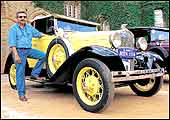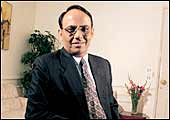 |
| Gartner's Hayward: RoI is
dumb |
That,
and more is what Gartner's Senior Vice President Bob
Hayward—he is also a personal advisor to Singapore's
Infocomm Authority and the Shanghai Municipal Government-had to
say to BT's Vandana Gombar recently.
If the Indian Government were to ask for
your counsel, what would you tell it?
- Imbibe a research culture
- Encourage the development of intellectual
property
- Chart a comprehensive e-governance strategy
for the country, combining federal and state units
- Invest in physical infrastructure
- Grow the domestic it market
- Bring more maturity in marketing of it services
How about moving to open-source software?
I would encourage the government to look at
open-source as an option but to ordain something like "thou
shalt use open-source" is silly. There are areas where such
software has its limitations-like high volume data intensive transactions.
If you are looking at clean-sheet environment, open-source is often
a good option. In cases where the original proprietary software
is to be totally replaced, the switching cost would be so enormous
that in a total cost of ownership calculation, proprietary software
will score better.
Whether it is the government or the corporate
sector, it is the ROI of IT investments that are being looked at,
but you have issues with that....
Yes. ROI is not a very smart way of looking
at it investments. I feel that typical business cases understate
the costs and risks, as well as the benefits. These should be looked
at through the lens of creativity and innovation, and how to take
the business process to a different plane, rather than just the
cost angle.
100
Years Of Ford-itude
A beauty-parade in Bangalore celebrates it.
 |
| 4-wheels good: Iqbal Patni
& his Model A Rumbleseat 1930 |
 |
| One for the road: Ford's
David Friedman flagging off Giridhar Patnakar's Ford A Cabriolet
1929 |
Had you been reading this article in
1920-just think this writer is Philip K. Dick and bear with us-you
may well be looking at an article headlined "India accounts
for 25 per cent of Ford cars sold globally.'' Actually, that line
isn't some form of (time) warped (science) fiction. According to
car historian Manvendra Singh, it is fact. "From 1910 to the
early 1920s India is believed to have imported 22,000 Ford cars
and trucks," he says. "What with Maharajas and sundry
princes patronising the car."
Some of these cars, and others of more recent
vintage gathered against the majestic backdrop of Bangalore's Palace
recently, participants in a vintage and classic cars rally organised
by Ford India to celebrate the brand's centenary. The oldest car
on display was a 1915 Tin Lizzie belonging to Ravi Prakash, the
Secretary of the Karnataka Vintage Cars Association. "I picked
this up a couple of years back, in non-running condition, for Rs
1 lakh. I spent a couple of lakhs restoring it; today, this model
could fetch Rs 50 lakh and I have had such offers-not that I am
selling," says Prakash.
Model As (one with a thermometer build into
the radiator cap that could be read from the driver's seat), station
wagons with wooden bodies, WW ii vehicles with spades, axes and
rifle holders, and (would the show have been complete without them?)
Ford Mustangs were all there. Bangalore, claims Hormadz Sorabjee,
Editor of AutoCar India, which partnered Ford for the show, is classic
Ford country. True enough, of the 31 vintage and classic cars that
participated in the rally, 23 came from the city. Ford India's Managing
Director David Friedman, who was seen examining some of the classics
closely, was visibly moved. Who wouldn't be?
-Venkatesha Babu
SELF-WORTH
Patriot Games
A self-confessed desire to save Indian companies
makes S. Gurumurthy Mr Fix-it.
 |
| Mr Mediator: We'd call him
a knight, only it isn't swadeshi |
Swaminathan
Gurumurthy, 54, chartered Accountant, RSS-hand for the past 31 years,
convener of the Swadeshi Jagaran Manch, an organisation with the
avowed objective of promoting India's economic self-reliance, Reliance-baiter
and, in his most recent avatar, India Inc's mediator-of-choice is
used to exactitude in his choice of words. Or others'. Even as I
congratulate the man for brokering the L&T-Grasim Industries
deal (for details, see Cementing The Future on page 62), I realise
my mistake. "There was no professional involvement; only the
assertion of a moral right," says a hurt Gurumurthy. "I
did not charge a single paisa, so how can you call me a broker?"
Mediator is a better word, and Gurumurthy is
a good one, although he doesn't make a vocation out of it. Still,
it is in his role as an unpaid arbitrator, that the commerce graduate
from Chennai's Vivekananda College-known for its erudition, much
like the city's Loyola College and Madras Christian College are
known for their state-of-cool-has made the news in the past few
months. First, at the behest of Sripad Halbe, a well-known lawyer,
he intervened in the Bajaj family spat. For those who came in late,
Shishir Bajaj wanted to untangle cross holdings so as to leave his
son with a clear line of succession-that meant selling his stake
in Bajaj Auto. Only, Bajaj Auto Chairman Rahul Bajaj and his younger
brother Shishir couldn't agree on the price. "I have always
brought fighting families together, but it is a difficult task,"
says Gurumurthy. "There isn't just an economic angle, but an
emotional one too."
In l'affaire Cemco, it was Chennai's ace eye
surgeon S.S. Badrinath of Shankar Netralaya, a common friend of
Gurumurthy and A.M. Naik, who requested that the chartered accountant
play the go-between, something the man was only too willing to do,
he says, to prevent 16 million tonnes of cement production capacity
from passing into the hands of a MNC. If the Grasim deal had fallen
through, the odds were high that L&T would hive off the cement
company and sell a strategic stake to a foreign cement major.
The numbers whiz from a village near the town
of Villipuram in Tamil Nadu would have probably remained just another
good-at-math chartered accountant had it not been his association
with the Indian Express Group's Ramnath Goenka. Along with the paper's
then Editor Arun Shourie, the trio took on the government and Reliance
Industries. Gurumurthy, whose firm Gurumurthy and Associates still
audits the books of the Indian Express Group continues to take on
India's largest corporate group: as recently as January 11, 2003,
he wrote to Finance Minister Jaswant Singh, reported to be one of
his good friends, over a December 1992 issuance by Reliance of Non
Convertible Debentures (NCDs) to 34 companies which, he alleges,
are shell companies controlled by the Ambanis. The issue of fraudulent
preferential allotment is being investigated by India's securities
watchdog SEBI and the Department of Company Affairs.
However, his own credibility has been diluted
some with reports of his lobbying for one of Reliance's rivals,
the Essar Group, and for friends like C. Sivasankaran of Sterling
Computers, and his consequent fallout with now Disinvestment, Information
Technology, and Telecommunications Minister Arun Shourie.
Gurumurthy claims all these reports are targeted
at discrediting him and maintains that he has no differences with
Shourie and that they still remain friends, only that the two have
very different roles to play. He also refutes stories about his
lobbying efforts for Essar, although he admits to lobbying for swadeshi
causes. "What is wrong if I present a point of view which I
feel strongly about, as long as I am not making any personal gains
from it?"
Nothing at all; only, if you are S. Gurumurthy,
Reliance-basher, swadeshi espouser, and a man with access to Prime
Minister A.B. Vajpayee, Deputy Prime Minister L.K. Advani, Finance
Minister Jaswant Singh, and the Shankaracharya of Kanchi you'd better
watch what you lobby for. You may just get it.
-Ashish Gupta
CELLULAR ALPHABET
Where's The Main Course?
The PM's China visit is a start and
only that.
 |
| Vajpayee's taste for China: We
didn't know he liked Chinese |
Go
ahead, call us cynics, but everytime something is labelled historic,
our eyes glaze over and we get that funny feeling in our heads.
Apart from reams of bureaucratic fine-print-surprise, surprise,
this was in the Indian dailies, not some government documents-regarding
sharing of legal information, India recognising the Tibet Autonomous
Region as part of China, China allowing Changgu in Sikkim as a border
trading point ("This is de facto recognition that Sikkim is
part of India," droned experts on a hundred television shows),
and the two countries agreeing to study each others educational
systems, the only tangible takeaway from the visit seems to be China's
decision to allow the entry of Indian mangoes. As for the rest,
here's a quick reckoner.
Will the visit help bilateral trade?
Well, Chinese Premier Wen Jiabao did suggest
that the two countries increase the volume of their bilateral trade
to $10 billion by 2005, but given that this figure should be $7.5
billion by the end of this year, that's a target that would have
been achieved anyway.
Will Chinese companies invest in India?
Beijing did announce the creation of a $500
million fund for investments in India, but given China's factor
advantages, this doesn't make much economic sense.
Does market-access become easier for Indian
firms now?
The companies that have made a mark-NIIT, Dr.
Reddy's, Aptech, Aurobindo-did so when relations between the two
countries were less than cordial. With Infosys' attempt to open
a Shanghai office tangled in red-tape, the visit changes nothing.
Will India and China forge a front at September's
WTO meet at Cancun?
The two sides do agree on issues related to
agriculture, trade-related intellectual property rights, and public
health and investment, but there has been no formal agreement on
this.
-Ashish Gupta
The J&J Case
The CBI chargesheets its top execs.
 |
| J&J's N.K. Ambwani: He's
not talking |
Two years after it stated that it was
investigating whether J&J India's senior executives flouted
the Drug Price Control Order, thereby evading taxes, on June 28,
the CBI filed a chargesheet alleging that five senior executives
of the New Jersey-based multinational's Indian arm, CEO N.K. Ambwani,
President of the Pharmaceutical Division, A.V. Dangi, and Executive
VP and Company Secretary R.R. Mallar violated the DPCO and evaded
taxes to the tune of Rs 45 crore.
India's small scale sector, and the drugs manufactured
by it, do not fall under the purview of the DPCO. The CBI chargesheet
claims that J&J "floated N.R. Jet Enterprises for fraudulently
availing benefit of price exemption on scheduled drug formulations
and availed such exemption by way of false declarations". N.R.
Jet, CBI officials say, was controlled by J&J through four investment
companies. They point to the fact that Coldarin, acquired by J&J
globally, from Knoll Pharma in 1997 for Rs 21.5 crore, was transferred
to N.R. Jet in India for a mere Rs 5,000 as further evidence.
For its part, J&J, always a secretive company,
maintains that it disagrees with "the characterisation of the
activities of our companies in recent media reports with respect
to certain pharmaceutical products that we market and sell".
A spokesperson says that the company is co-operating with government
agencies, but refuses to elaborate. The case is likely to be heard
on July 12, but our feeling is, we haven't heard the last of this.
-Ashish Gupta
|

